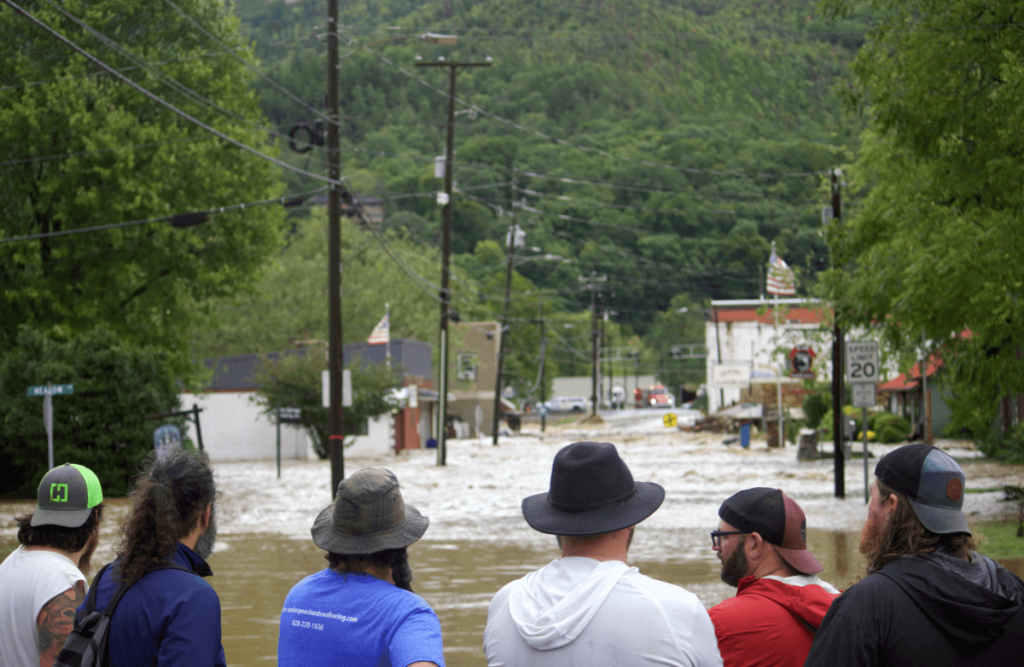This post is a recounting of the events leading up to, during, and after my hometown, Hot Springs, North Carolina, was devestated by Hurricane Helene.
Tuesday Morning, September 24th
As I stepped away from visiting my father, my phone vibrated in my pocket. His health has been fragile lately, and I wanted to be near him before the storm clouds rolled in. When I answered, it was Josh Copus, a dedicated board member of Azule and the proud owner of the Old Marshall Jail. Azule is a non-profit art residence tucked away in the Appalachian Mountains just outside of Hot Springs, NC. I work there as the coordinator. Josh’s voice held a tinge of concern, echoing the unease we both felt about the approaching storm. After all the care and energy we had poured into planning the Azule Jamboree Fundraiser, we knew deep down that the wisest and safest path was to postpone the event.
Wednesday Evening, September 25th
I played a show with my longtime musical collaborator, Pierce Edens, at an event in downtown Hot Springs this particular evening. The event, Stories of Hot Springs, was hosted by Sue Gurnee, another cherished member of the Azule board, at her beautiful Pine Hall. Throughout the day, I found myself in conversation with members of the fire department and raft guides—two groups who understand, better than most, the raw and untamed force of a river when it’s pushed beyond its banks. The rain had already begun to pour, fast and unrelenting, with the creek swelling at every glance. Helene still lingered far off in the Gulf, but her presence was already felt.
As I made my way out, I voiced my concerns about the storm’s approach. Sue, with her usual grace, offered Pine Hall as a shelter, should it be needed. I couldn’t bring myself to tell her what weighed on my heart—that Pine Hall would likely be underwater before all was said and done. This storm would surely become one of those fabled “Stories of Hot Springs,” woven into the town’s history and retold for generations, its memory lingering long after the waters recede.
Thursday Morning, September 26th
The day I had long anticipated—the original date of the Azule Jamboree Fundraiser—began not with music, but with the static of my EMS scanner. The morning was still quiet when Hot Springs Fire Chief Josh Norton radioed the Madison County Emergency Operations Command: River Road had been closed near the 2500 block. The river had already claimed part of the road, swollen and restless. Helene would not reach us until the wee hours of the next morning.
Living on a hayfield width away from the river, I could feel the urgency in the air. I packed a few nights’ worth of clothes, grabbed my trusty camping bag, and headed to my sister’s, not knowing it would be nearly a week before I could return to the comfort of my home. Alongside my work with Azule, I serve the town in certain capacities, so I stopped by the mayor’s office with my laptop, ready to assist however I could, offering to help spread vital information. Chris Donachad, ever generous, welcomed me to set up a temporary office in a quiet corner of his Big Pillow Brewery. But as the hours slipped by, I realized my place wasn’t behind a screen—it was out on Main Street, alongside my neighbors, filling sandbags and delivering them where they were needed most, as we all prepared for the storm’s inevitable reach.
Friday Morning, September 27th
I walked the street with my neighbors. An older man remarked, “I don’t remember it being this bad in 1977.” Before this storm, that flood had always served as the benchmark for how severe conditions could get. The streets were alive with community members gathering to watch Spring Creek overflow the downtown bridge. An oil barrel had snagged on the railing, causing trees and debris to accumulate and form a makeshift dam. Water began spilling into the streets on either side of the creek, gradually creeping further. It was clear this situation was worse than 1977—and, as it would turn out, worse than anything we had recorded in Hot Springs’ history.

The community sprang into action where we could. I noticed cars being redirected off I-40, which had sustained significant damage, through our flooded town. Both routes through town were completely blocked. I borrowed a vest from the fire department and started guiding travelers.
Within the first hour of directing traffic, I had my message down. “Both directions moving forward are completely impassable. The only way out of town is to turn around and go back to Newport, Tennessee. I know that is probably where you are coming from, but there are simply no options from here.”
It felt surreal to say that. Hot Springs has always been a tourist destination, serving as a hub for highways, rivers, trains, and the Appalachian Trail. Our economy relied on welcoming and taking care of travelers. We were quite good at it, too. Yet in that moment, all I could tell them was, “You need to leave. Please come back and see us once we rebuild.”
This is the first post in what will be a series covering the destruction and rebuilding of my tiny Appalachian community.